Dolce far niente
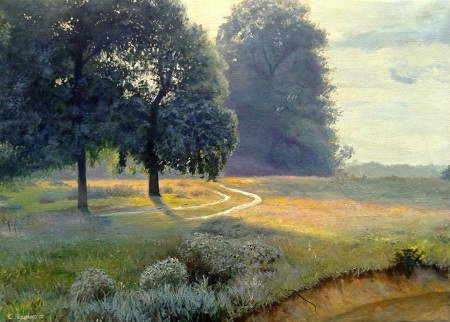
Summer Morning
How beautiful the morning,
When summer days are long;
O, we will rise betimes and hear
The wild-bird’s happy song–
For when the sun pours down his ray
The bird will cease to sing;
She’ll seek the cool and silent shade,
And sit with folded wing.
Up in the morning early–
‘Tis Nature’s gayest hour!
There’s pearls of dew upon the grass
And fragrance on the flower.
Up in the morning early,
And we will bound abroad,
And fill our hearts with melody,
And raise our songs to God.
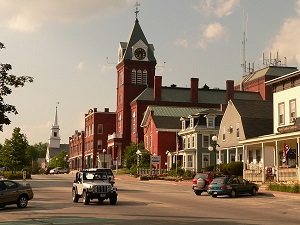
Newport, New Hampshire, de geboorteplaats van Sarah Josepha Hale
De Nederlandse dichteres en schrijfster Anna Enquist werd geboren op 19 juli 1945 in Amsterdam als Christa Boer. Zie ook alle tags voor Anna Enquist op dit blog.
Mijn zoon
Mijn zoon stormt door het huis,
een roffel op de trap. Hij is
zichzelf een motor. Het lied
dat in hem leeft ontsnapt hem
soms. Ik hoor hem zingen
op de gang en zwijg.
’s Nachts is hij bang, hij twijfelt
aan zichzelf, aan ons, de wereld.
Ik neem hem in mijn arm
en zonder spreken vaag ik
de oorlog weg en kinderkanker,
mijn eigen dood, het monster van de tijd.
Ik lieg hem voor en red hem
tot wij beiden slapen in gestolen veiligheid.
Winterwerk
De sarabande spelen op de vrieskoude
deel. De uilen hebben het klavier onder-
gescheten. Stom staan de dingen
van de zomer om je heen, strohoed,
trompet. Omhoog die bovenstem, waar
vogels schuilen op de balk, en dan omlaag.
Vertraag het lied, houd in totdat bloed
stolt en adem stokt. Kan zij nu gaan?
Doorspelen. In de bas orgelt een toon
die alle tegenstemmen op zal zuigen.
Hollen of stilstaan – maakt niet uit,
je hamert hoorbaar op het einde aan.
Niet meer dan vilt op staal, lucht
die uittrilt tot stilte. Slechts een dag
in de gestage rij van dagen.
Conversatie met de kinderen
Aan tafel gaat het over
wreed. Dat je een lied zingt
waar de ander van moet huilen,
en dat je dat wéét, zeggen zij
zwaaiend met hun lepels. Zeker.
Of met een licht de trage
zwarte kreeften lokt. Jij
in de boot. De dieren spoeden
zich, kunnen niet anders doen
dan ijlen naar wat trillend
fonkelt achter raster dood.
Het ergste is de dolkstoot,
vinden zij. Dat iets geheels en
gaafs zo onverhoeds wordt aangetast
en voortaan niet meer zelf is
maar in binding met het wapen
dat zich toegang eist, en breekt, en krast.
Ontroerd, geobsedeerd, verwond
hoor ik hoe zij het wapentuig
van liefde argeloos als wreed
benoemen. Zonder aarzeling.
Boven de soep houd ik mijn mond.
(Schumann, Kinderszenen, opus 15)
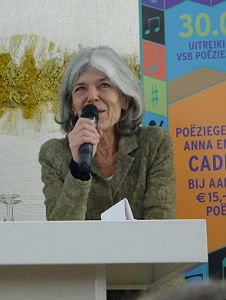
De Franse schrijver Laurent Binet werd geboren in Parijs op 19 juli 1972. Zie ook alle tags voor Laurent Binet op dit blog.
Uit: La septième fonction du langage
“Au Flore, à côté d’une petite bonne femme blonde, ils aperçoivent un homme qui louche derrière de grosses lunettes, il a l’air souffreteux et sa tête de grenouille dit vaguement quelque chose à Bayard, mais ce n’est pas pour lui qu’ils sont là. Bayard repère les hommes de moins de trente ans et va les aborder. La plupart sont des gigolos qui draguent dans le secteur. Est-ce qu’ils connaissaient Barthes ? Tous. Bayard les interroge un par un tandis que Simon Herzog surveille Sartre du coin de l’œil : il n’a pas l’air en forme du tout, il n’arrête pas de tousser en tirant sur sa cigarette. Françoise Sagan lui tapote le dos avec sollicitude. Le dernier à avoir vu Barthes est un jeune Marocain : le grand critique était en pourparler avec un nouveau, il ne connaît pas son nom, ils sont partis ensemble l’autre jour, il ne sait pas ce qu’ils ont fait ni où ils sont allés ni où il habite mais il sait où on peut le trouver, ce soir : aux Bains Diderot, c’est un sauna, à Gare de Lyon. « Un sauna ? » s’étonne Simon Herzog, quand surgit un énergumène en écharpe qui lance à la cantonade : « Regardez-moi ces gueules ! Elles n’en ont plus pour longtemps ! En vérité, je vous le dis : un bourgeois doit régner ou mourir ! Buvez ! Buvez votre Fernet à la santé de votre société ! Profitez, profitez ! Chassez ! Périclitez ! Vive Bokassa ! » Quelques conversations s’interrompent, les habitués observent le nouveau venu d’un œil morne, les touristes essaient de profiter de l’attraction sans bien comprendre de quoi il s’agit, mais les serveurs continuent à servir comme si de rien n’était. Son bras balaie la salle d’un geste théâtral outré et, s’adressant à un interlocuteur imaginaire, le prophète à écharpe s’exclame sur un ton victorieux : « Pas la peine de courir, camarade, le vieux monde est devant toi !
(…)
Quand Jacques Bayard arrive devant la chambre, il découvre une queue de plusieurs mètres dans le couloir. Tous attendent pour rendre visite à l’accidenté. Il y a des vieux bien habillés, des jeunes mal habillés, des vieux mal habillés, des jeunes bien habillés, des styles très variés, des cheveux longs et des cheveux courts, des individus de type maghrébin, plus d’hommes que de femmes. En attendant leur tour, ils discutent entre eux, parlent fort, s’engueulent ou lisent un livre, fument une cigarette. Bayard, qui n’a pas encore bien pris la mesure de la célébrité de Barthes, doit vraisemblablement se demander ce que c’est que ce bordel. Usant de ses prérogatives, il passe devant la queue, dit « Police » et entre dans la chambre.”
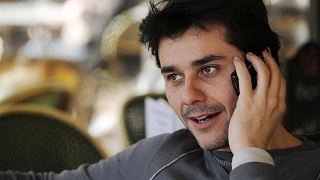
De Zweeds – Palestijnse dichter, toneelschrijver, journalist en literair criticus Ghayath Almadhoun werd geboren op 19 juli 1979 in Damascus. Zie ook alle tags voor Ghayath Almadhoun op dit blog.
For Damascus
This summer seeping through the fractures
of Damascus is killing me. I creep like rust
on the doors of this prison, now turned
into a museum. I sit in a cafe
frightened and shrinking on days
when money is scarce, and laughing loudly
on days when my shifty pockets are full.
Damascus is my cracked home, and
Kasyon is what I grieve. I sprawl
in the evening like horns of cars
and carts of broad beans. Strangers and
tourists take to me. I am fenceless, any
joy that betrays me, returns
in sorrow to my laughing face. I
am a weird blend; my face mirrors
the wretched and the shopfront displays.
My body is fields of burning
wheat and my tongue scolds like a shoe.
The policeman, the teacher and
the mysterious man stare at me, so I sadly
laugh, and they joyfully cry. Damascus
is mine, and I will not share my bed with
anyone other than the wicked and
the whores. I am the descending ladder
to high pits and the footsteps of thieves
on the sand. My body is a departure
motel and my words are tiny gospels that
the prophets had lost, so the prodigal sons
embraced them. Therefore, I will toss the crumbs
to birds on barbed wire, and I will castrate
glory on asphalt. This is what they taught us
in public schools, before they let us off
like rabbits to chew the grass
of submission. I said to you that I will not
allow anyone to sneak in and peek at Damascus
as she bathes alone, her small
breasts timidly uncovered, I will not
let you
in.
Vertaald door Zeina Issa

De Franse schrijver en filosoof Jean-Pierre Faye werd geboren in Parijs op 19 juli 1925. Zie ook alle tags voor Jean-Pierre Faye op dit blog.
Le visage qui va
Le visage qui va
voir, est aussi regardé
juste avant qu’il ne lève
les yeux au-devant, et ne soit traversé
– maintenant il est juste
moulé dans la lumière, modelé
du dehors, caressé
le long du cou, de la hanche
et des reins, jusqu’à la confluence
des jambes et du ventre
et jusqu’où il est ventre et corps
mais lève les yeux, ouvre
ce trou dans la distance, le long
des murs chauds ici, rouges
délabrés, marqués de joints écaillés
et jusqu’au fond et aux arbres
au chemin de son, passé et crissé
à peine prenable, ici
elle, confondue
peu à peu avec les murs
assise, fondue dans le ciment
et les grandes écailles tracées et détachées
écoutant longtemps et voyant
appuyée au revers de main, et
ne cessant pas de rester et d’être
durable et dessinée
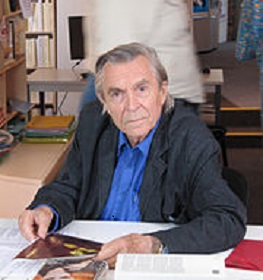
De Zuidafrikaanse dichter Lucas Cornelis Malan werd geboren in Nylstroom op 19 juli 1946. Zie ook alle tags voor Lucas Malan op dit blog
In Camera 1
Ensconced in Duchess Court she managed to retain
some antique furniture and a precarious dignity:
and after fifty years as midwife also the knack
of charming people. Here she preserves photographs,
old journals and her pain in specific detail.
The Royal Albert tea service (picked out
at Anstey’s as a bride) she uses only
for teas such as this – and all the snacks I made myself.
Now, this is the lounge where we will have our tea.
But let me show you something at the back
– please excuse the mess round here, I am
a dressmaker too, you know – designer stuff –
the place gets terribly untidy; and then, of course
Lindy’s always underfoot. Sit down! Now sit!
She gets so worked up, you see. And this gate
I had installed for my security. But just take a look
out there: You can almost see eternity. Now,
have you ever seen a view like that?
This gown I made for Marguerite. She came
round here this morning – Miss South Africa of ’68.
Never married, do you know? And still
as beautiful, although she’s put on weight.
Poor girl. I wonder, though . . . Oh, never mind,
that’s, after all, the way things go. Now come,
let’s have some tea. Do you know this? Earl Grey,
which Gavin brings from London, always fresh.
He’s with SAA, a gentleman and very kind –
The sun is shifting, she makes more tea. We speak
of this and that: My husband died in ’83, how sad
for me who had no kith or kin. But then, you see,
the Lord provides: my tiny Lindy here
is like a child and always such a joy. But what
is to become of her if I – She speaks, and all the while
the light around us fades. It’s getting late,
she notes, but don’t go yet! You have to see
the view at night. I go along with her to look:
Like a sea the city lies, incandescently inflamed
in outgrowths round the core, the outskirts –
like a nocuous yellow flicker along the seam
dividing elite and deprived neighbourhoods:
a Milky Way torn off by gravity. This is a place
of people, of passion and loneliness. She looks:
You know what this reminds me of? I listen
and then leave. But embedded in that metaphor
(a cemetery alight) I see an old placenta
splayed out – black and terminal with blight.
Vertaald door Charl J.F. Cilliers en Lucas Malan
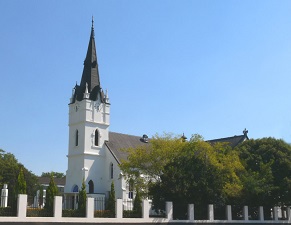
De NH kerk in Nylstroom
De Indiase dichter en schrijver Dominic Francis Moraes werd geboren op 19 juli 1938 in Bandra. Zie ook alle tags voor Dom Moreas op dit blog.
KANHERI CAVES
Over these blunted, these tormented hills,
Hawks hail and wheel, toboggan down the sky.
It seems this green ambiguous landscape tilts
And teeters the perspective of the eye.
Only two centuries after Christ, this cliff
Was colonised by a mild antique race
Who left us, like a faded photograph,
Their memories that dry up in this place.
They left no ghosts. The rock alone endures.
The drains and cisterns work, but wrecked the stairs;
Blocks are fallen: sunlight cracks those floors,
And fidgets in a courtyard where a pair
Of giant Buddhas smile and wait their crash.
Then temples, audience-halls, a lonely tomb.
I touch its side. The stone’s worn smooth as flesh.
A stranger dangles peaceful in that womb.
Worm he will be, if born: blink in the sun.
I’ll crawl into his dark; perhaps he’ll climb
Beyond the trippers to the final stone
Flat of the hillock, there to grow in Time.
Dry pubic ferns prickle the bitter sand.
Hawks in a hot concentric ecstasy
Of flight and shriek will wake his vision.
And When the clouds lift, he’ll glimpse the miles-off sea
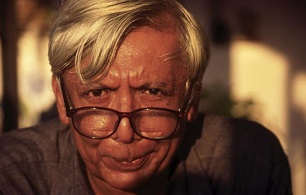
De Griekse dichter Miltos Sachtouris of Miltos Sahtouris werd geboren in Athene op 19 juli 1919. Zie ook alle tags voor Miltos Sachtouris op dit blog.
The Poet’s Head
I cut off my head
I put it on a plate
and took it to my doctor
— There’s nothing wrong, he said,
it’s just overheated
throw it in the river and we’ll see
I threw it in the river with the frogs
and it raised a dreadful racket
it started shrieking and howling
all kinds of strange songs
I picked it up and put it back on my neck
and roamed the streets in a rage
with a poet’s green hexagonometric head
For Spring
The sun is green
the trees are burning
awaiting the swallows
our iron swallows’ nests
no longer fool us with their flowers
they cost us our arms and legs
now our arms and legs are hanging
from the trees
Vertaald door Karen Emmerich
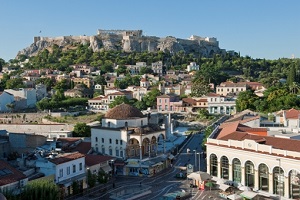
Athene
Zie voor nog meer schrijvers van de 19e juli ook mijn blog van 19 juli 2017 en ook mijn blog van 19 juli 2015 deel 1 en eveneens deel 2.
